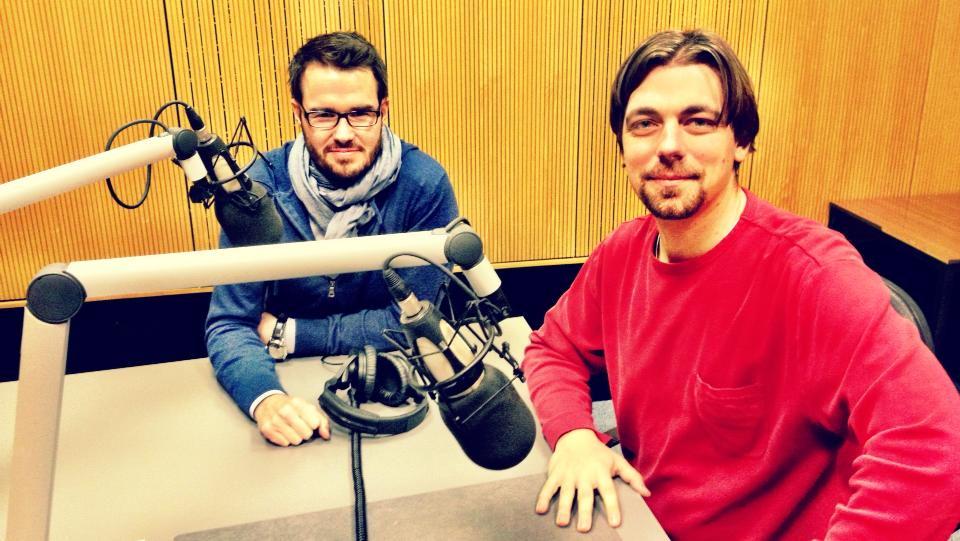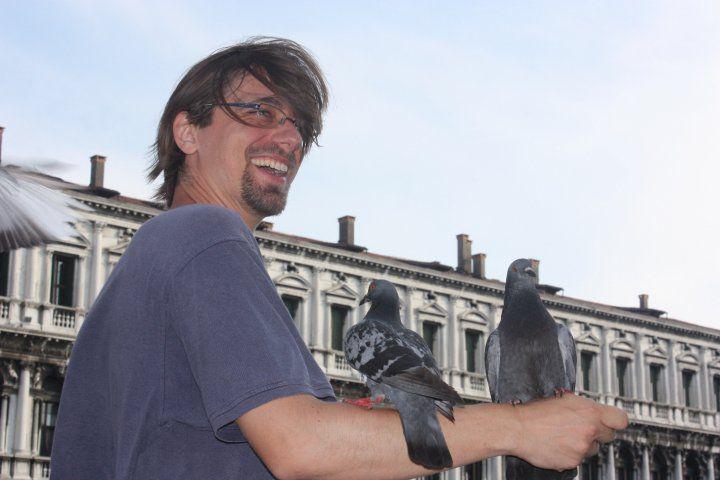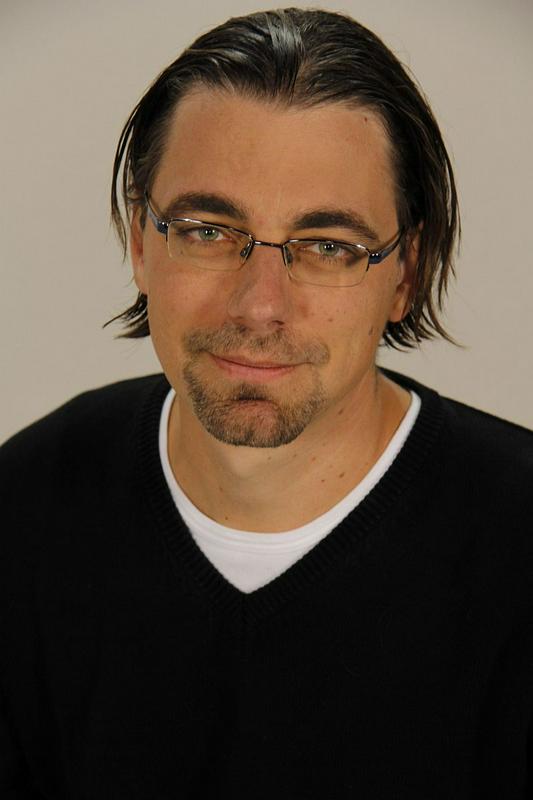
I can definitely understand why so many people give up, but I just couldn't accept the idea of living here and not speaking the language. It seems rude... but it's also a way of cutting yourself off from a whole culture – not to mention a language that is maddening but at the same time fascinating and beautiful.

It's funny but whenever I ask my friends for good Slovenian literature they usually get angry because they had to read Cankar in school and tell me to stay away from him.

No one had any f...... idea. My roommate thought I was going to "Siberia." (“Dude, Russia’s awesome!”) Another lady asked me if Slovenia was where "Dracula was from"? (i.e. Transylvania) But New Yorkers are famous for being very insular. They don’t really care that much about anything going on outside of New York.
Michael Manske came to Slovenia from New York. The American born in Germany after his study of journalism, more than a decade ago moved to ... Slovenia. He had expected an industrial landscape with coalmines, and had imagined he would look for work at ORF in the neighbouring country, but it turned out differently. The beauty of the land came as a surprise, and at that time Radio Slovenia International started broadcasting from Maribor, as a part of RTV Slovenija, addressing foreign language speaking audience.
Manske is known for his show "Kako postati Slovenec" ("How to become a Slovenian"), presently suspended, as Manske, among other things, heads that part of redaction which is preparing news and shows in the English language. He considers Radio Si, the first and only radio in a foreign language in Slovenia, as a bridge between Slovenia and foreign languages speaking audience, including foreigners living in Slovenia, tourists visiting Slovenia, and descendants of Slovenians living abroad who have lost contact with the language, but are still interesting in the country their parents and grandparents originate from.
From this interview you will learn Manske's thoughts on Slovenia, on the beauty and difficulty of the language, and on other things as well. Attached you can find the audio recording of "How to be a Slovenian".
You have been living in Slovenia for more than a decade. Do you feel at home here?
I do and don't. I do feel comfortable in Slovenia and absolutely love being here, but I know I'll always be "that guy who moved here from New York." There's no real way to become a Slovene and be accepted as one -- you have to be born that way. This means I'll always be seen as a foreigner, no matter what I do. It's interesting. Slovenia and most of Europe follow the principle of jus sanguinis (the right of blood) which means someone could be born on the Triglav Lodge on Kredarica during an Avseniki concert on Rudolf Maister Day and the child would not automatically be a Slovene. It depends what the parents are. That kinda blows my mind. It's the opposite of the U.S. and Canada, where blood doesn't matter. If you're born there, you're automatically a citizen.
Your show How to become a Slovenian is very popular; in this show you describe the habits of Slovenians in an entertaining, houmorous manner (but with a lot of teasing), as seen by a foreigner. You simply don't run out of material. How would you comment that?
It's on hiatus!
When listening to individual episodes, I got the feeling that you have been, especially lately, affected by the changes brought about through dissatisfaction, fear, and uncertainty caused by the crisis. You tackled such topics as public servants, (non)existence of the Slovenian patriotism, alcohol abuse. Indeed humorously, but with a bitter aftertaste.
Yeah, it might have turned out differently if it wasn't for all the bad news happening while I was writing them. The episode about how to "zrihtaj" things was definitely inspired by the fact that every other day another businessman/politician seemed to be accused of corruption. But the shows were always put together with love. I love the country and love the people, and wanted the episodes to reflect that. People sometimes forget that I chose to live here and I've also chosen to stay. In fact, it drives me crazy when other foreigners complain to me about stuff – the last thing I want to do is bitch and moan about things. The point was rather just to look at the challenges and joys of living here and laugh about them and laugh at myself.
Are we Slovenians capable of laughing at ourselves? Have you received any negative responses?
Laughing at others seems to be something of a national sport, I would say. The only truly negative reaction I got was when I talked about driving and cars. Looking back, I should have known not to touch the subject.
You haven't yet commented on the media sphere in Slovenia. How do you evaluate it?
That's another one I don't want to touch. Certain subjects just aren't worth talking about. The big ones are: cars, politics, and the Second World War. And by off-limits, I just mean that bringing them up only makes people really angry really quickly and no good ever comes out of it. Ever. Unfortunately, those subjects seem to constantly come up anyway. Especially in the comment sections of websites like MMC. What are the chances that someone will call me a "typical clerofascist American reactionary" in the comments? Or "typical communist RTV employee"? My guess is somewhere near or above 100 percent.
You are working as a journalist, a creator, and a moderator at Radio Slovenia International, which is an integral part of RTV Slovenija, intended for foreign listeners. What do you consider the biggest challenge?
The hardest part is pleasing a fragmented audience. Our audience is a wide mix of foreigners living in Slovenia, commuters, Slovenes living abroad, and Slovenes living here who can't stomach the jabber of commercial radio and also enjoy foreign languages and good music. The hardest part is putting together something that appeals to everyone.
Radio SI is the only radio channel broadcasting in a foreign language. Who is listening to it? Do you get feedback from your listeners, and what is your opinion on the need for such a programme?
We get lots of great mail from Slovenia and from all around the world. We're in a unique position because we serve as a sort of bridge from Slovenia to the rest of the world. It's worth mentioning that roughly the same amount of people travel through Slovenia as live in Slovenia, so you have a huge population of people who might be interested in the country but don't speak the language. Likewise, there are a ton of people living all around the world whose parents or grandparents were Slovene and who are interested in what's happening in their "mother country".
What happened with your blog? It was very well accepted, it even won a prize for the best European blog, and then it disappeared! Have you already said everything you had to say, or should we blame the lack of time?
I was definitely running low on time and energy, but I could also see that the future was on Facebook and Twitter. And for reasons that I don't fully understand, I've never been able to really enjoy either of them.
You were born in Germany, you lived in different parts of the USA during your childhood years and adolescence, lastly in New York. Are New Yorkers really a special "species" of people?
It's definitely its own universe. I've lived in many different American cities and visited many more, but New York is nothing like any of the others. It's definitely a great place to be if you want to be yourself and not worry what other people think of you. But it's also a much more friendly place than I think many people imagine.
It seems strange that a New Yorker, even if not a born one, would move to Slovenia. Did your friends find your decision unusual? Where did they think you were going?No one had any f****** idea. My roommate thought I was going to "Siberia." ("Dude, Russia's awesome!") Another lady asked me if Slovenia was where "Dracula was from"? (i.e. Transylvania) But New Yorkers are famous for being very insular. They don't really care that much about anything going on outside of New York. To be honest, what truly shocked me was meeting Austrians and Italians who didn't know where Slovenia was. That really rocked my sense and sensibilities.
And what about you? Did Slovenia come as a shock to you?
I was surprised by how beautiful it was. I was definitely expecting worse. I thought there would be a lot of old coal factories and that it would be very industrial. But it isn't at all. Even places that many Slovenes think of as "industrial" – like Velenje – are flat-out gorgeous compared to industrial American towns like Pittsburgh, Detroit or Cleveland. And speaking of Velenje, let me go on record to say that their accent is my favorite. I have a coworker from Velenje and sometimes I'll stop and ask him questions just so I can hear him talk. I don't even pay attention to what he's saying, I just totally enjoy the musicality of the dialect. (Sorry Mišel!)
Had you any idea where you might find work? How did you start cooperating with Radio SI? What did you do in the beginning?
In journalism school I met a guy from ORF and my original plan was to go work for them. But just a few weeks after I arrived, Radio Si started.
Now you are journalist and editor, head of the English editorial office. What kind of a boss are you?
Very hands off, I would say. I grew up with very hands-off parents and was very independent. I was just expected to do well in school and not bother them with any problems I had inside or out. I went to a boarding school in Princeton when I was around 14 and after that I was more or less on my own. It definitely helped me in the sense that I can find my way around. But it's also shaped me negatively as well. When my kids started asking me for help with their homework I felt lost and confused – as silly as it sounds, I'd never learned to do that. I had no real frame of reference. I have the same difficulty as a boss. I just kind of expect everyone to fulfill their obligations. I'm happy to help, but don't really know how to hover over someone and make sure everything is ok.
How do you motivate your subordinates?
A good question for them!
A lot of foreigners who move to Slovenia start learning the Slovenian language, but then give up. You persisted. Was it difficult?
Well, I wanted to give up every single day but felt compelled to go on. The language is brain-bustingly difficult. And it's hard as hell to stay motivated when you see that: 1) Almost everyone speaks English, so it's easy to survive speaking no Slovene at all, 2) Even if you learn the language, many dialects (like Prekmurian) will still remain a total mystery, and 3) People are nicer to me when I speak in English than when I speak in Slovene. I can definitely understand why so many people give up, but I just couldn't accept the idea of living here and not speaking the language. It seems rude... but it's also a way of cutting yourself off from a whole culture – not to mention a language that is maddening but at the same time fascinating and beautiful.
A number of anecdotes arose from learning the language. The one about cocoa, for example...
When I arrived in Slovenia I wasn't a coffee drinker at all. The whole cafe culture doesn't really exist in the United States. So one of my first problems was what to do when going out with friends. They would all order variations of coffee, but I didn't like the taste at all. Very early on, I had learned the word "kakav" but didn't know how important the intonation was. So when the waitress asked me what I wanted, I decided to impress my friends with my beginners' Slovene and told her: "Jaz bom kakal."
Which is the greatest challenge the Slovenian language presents? You like the dual, perhaps the accentuation?
The countless endings. The English possessive, for example, is a simple matter of ending an 's. In Slovene you get a whole rainbow of possibilities – and you have to take into account the noun's gender and the number before you even begin to try to pick the right one. It hurts my cerebellum just thinking about it. Every Slovene should be awarded a Nobel prize in linguistics for being able to speak the language at all.
Are you satisfied with your proficiency, or are you still working on improving your knowledge?
No, I'm constantly trying to get better. But it's very hard to find good resources. I signed up for a Slovenian language class once. It was at a local language school. On the first day, the teacher walks in and says something like: "Ajde da pričamo slovensko!" and my heart just sank into my feet. I thought: "Jesus, don't tell me I've gotta learn Bosnian before I can learn Slovene!" That's the first class I ever quit.
You mentioned reading as one of your hobbies. What is your opinion on Cankar?
It's funny but whenever I ask my friends for good Slovenian literature they usually get angry because they had to read Cankar in school and tell me to stay away from him. I have a book of Kosovel's poetry that I quite enjoy. "Veter" gives me chills every time I read it. Elegant simplicity really tickles my cherries.
Which Slovenian word makes you laugh, and which you consider the most difficult?
It took me years to say words like »pokopališče« instead of something that sounded like "plapolalipshep". Words that still haunt me include things like "zahod" and "Hajdina." For some reason, I can never remember if the stress goes at the beginning or end. I have to check every time, and every time I forget. It's frustrating. As for laughing: I absolutely love the phrase "K*** te gleda." It never gets old for me. I get the funniest picture in my head. Why is it looking at me? It's so funny and odd that I don't take it as an insult.
Are you homesick? Do you frequently return home, and – do you still consider the USA "home"?
My family and friends are still in the U.S. so it always feels like going home. But in a weird way, so much American culture is in Slovenia that it's hard to feel homesick. Everyone around me talks about American movies, American books, American TV shows, American sports and American music. They argue about American foreign policy, and react to news happening in the United States. Sometimes it feels like I'm surrounded by Americans speaking Slovene.
What do you, as an American, miss the most in Slovenia?
I sometimes miss the general optimism in the U.S. That seems to be pretty lacking here. I feel like there are a lot of Slovenes who are totally down on the country. They hate everything. They call Slovenia a banana republic and "Slovenistan" and tell me I was an idiot to come here and that everyone in government, business, media, and the justice system are idiots too. And while I do think a lot of shitty things have happened, and that it's important to speak out against them, I wish more people would say things like: "...but I'm going to do my best to make things better, even if it's just a little bit better."
Aleksandra K. Kovač, translated by G. K.
I can definitely understand why so many people give up, but I just couldn't accept the idea of living here and not speaking the language. It seems rude... but it's also a way of cutting yourself off from a whole culture – not to mention a language that is maddening but at the same time fascinating and beautiful.
It's funny but whenever I ask my friends for good Slovenian literature they usually get angry because they had to read Cankar in school and tell me to stay away from him.
No one had any f...... idea. My roommate thought I was going to "Siberia." (“Dude, Russia’s awesome!”) Another lady asked me if Slovenia was where "Dracula was from"? (i.e. Transylvania) But New Yorkers are famous for being very insular. They don’t really care that much about anything going on outside of New York.


































































